- Home
- Q. Patrick
Death Goes to School Page 2
Death Goes to School Read online
Page 2
An animated scene awaited her. At the old upright piano Sophonisba was skimming through the music with Mr. Heath, the mathematics master. On the window-seat Mrs. Bernard-Moss, in an almost shockingly low evening gown, was indulging in very secular conversation with the Bishop of Saltmarsh. The remaining guest, Sir Wilfrid Pemberly, was waxing hot as chutney over Indian reminiscences with Mr. Dodd.
“Well, well,” she remarked, “you’ll all be wanting to have a last glimpse of your boys before they go to bed, won’t you? Oh, Mr. Heath, would you be so kind? Yes, Moss major and minor, Lucas and—Pemberly. Thank you.”
Cyril Heath moved towards the door.
“And, Mr. Heath, you might ask Mr. Nettleton if he’d drop in. I know Mrs. Bernard-Moss would like to hear him sing. Such a fine baritone voice. …”
The American lady turned round swiftly, but did not speak.
“Mr. Nettleton’s on duty in the dormitories, Mother,” put in Sophonisba briefly, glancing up from the pile of music. “Someone will have to look after the boys. There’ll be high jinks tonight.”
“Very well, Mr. Heath, if Mr. Nettleton is not available perhaps Mlle. Santais would care to come down.” Mrs. Dodd never forgot to let people know that the staff and boys at Craiglea were “just one large happy family.”
The door closed behind Mr. Heath, only to open again within a very few minutes to reveal the unobtrusive figure of Mlle. Heloise Santais. Had it not been for a rather pungent odor of lilies, no one would have noticed her entry.
To her fellow staff members, this sallow-skinned young Frenchwoman was a dark horse. She had been hired during the previous term when Mlle. Soubiron had left unexpectedly to get married. Her past life was shrouded in self-created mystery. She had given few but excellent testimonials. In her first interview with Mr. Dodd, she had said she came from Paris and gave the headmaster to understand that her accent was as irreproachable as her character. All other information she kept safely stowed away behind her deep-set eyes.
Now, as she slipped into a chair, she did not speak. She seemed completely absorbed in contemplation of Mrs. Bernard-Moss. Her eyes were fixing her in a dark, inscrutable gaze which did not alter until Mr. Heath breezed in with his four charges.
“Enter four young hopefuls,” the mathematics master exclaimed with unnecessary emphasis.
The boys presented a strange contrast as they stood there, blinking nervously at their respective parents.
“Well, my boy.” Dr. Lucas, Bishop of Saltmarsh, beckoned his son and slipped two half-crowns into his grubby hand. “I hope we’re going to see you in the cricket eleven next year.”
St. John Lucas’s freckled face broke into a grin. “And I jolly well hope,” he whispered, “that you’ll let me teach you to bowl overarm, Dad. Those bally lobs…”
“Overarm, eh!” chuckled the Bishop. “I’m too old, my boy, too fat! Here, Sir Wilfrid, what would you say if your son…?”
He broke off suddenly. Derek Pemberly was standing in front of his father, and to anyone not accustomed to his appearance, it usually came as a distinct shock. He was one of those boys who is euphemistically called “backward,” though “forward” would perhaps often be a more apt description. For Derek Pemberly—aged thirteen—was actually taller than his father. His cheeks and upper lip were covered with downy hair. His chest was as powerful and overdeveloped as a young gorilla’s. His body, however, had far outgrown his mentality, and he suffered from a strange deformity of speech which caused him to twist his face into distressing contortions whenever he tried to talk.
Though naturally anxious to keep this boy in the background when visitors were about, it was to Mrs. Dodd’s credit that she bestowed on him as much care and affection as she did on the others. Thus she and her husband had placed Sir Wilfrid under an obligation which no amount of money could ever repay, and of which even the waspish Chief Constable was more than conscious.
For the Moss twins, who were standing stiff and sulky at their stepmother’s side, Mrs. Dodd felt no such affection. It was obvious to her trained eye that the American lady, despite a great deal of affectionate crooning, was not making much progress with her husband’s children. Mrs. Dodd hurried over to ease the tension.
“Oh, Mrs. Bernard-Moss, Eric and Irving are so good at nature study. It’s really remarkable how quickly they’ve learnt the names of all the flowers and butterflies and animals and things. They’re quite the best naturalists we have in the school.”
Mrs. Bernard-Moss shot a dazzling smile at her stepsons. “Oh, yes, indeed. I remember the Judge speaking to me about it.” She turned to Eric with well-simulated interest. “Please tell me all about these lovely English wild flowers.”
The two boys began to unbend slightly. For the rest of the interview they chatted on almost with enthusiasm.
As the clock struck nine-thirty, Mrs. Dodd clapped her hands and exclaimed:
“Come on, boys. Time to be off.”
There followed the usual strained adieux, Derek Pemberly backed away from his father without speaking. St. John Lucas reluctantly kissed the Bishop’s bald head. The Moss twins each accepted a pound note from their stepmother without emotion and shrank visibly from her valedictory embraces.
“’Night, Mrs. Dodd. ’Night, sir. ’Night, Mr. Heath. ’Night, Miss Dodd. Bon nuit, mam’selle.”
The boys scurried out into the passage.
At the top of the stairs Moss minor departed to his own sleeping-quarters and the three other boys pushed open the door of B dormitory.
The lights were switched off and after a few minutes silence descended upon B dormitory.
In his bed next to the door, Lucas pulled the sheets up to his chin and tried to go to sleep. But the creampuffs—so light and airy at supper-time—now lay heavy on his stomach. They left him a prey to that mental anguish known only to little boys who have overindulged.
It was stiflingly hot in the dormitory despite the open windows and door. Every now and then a distant flash of sheet lightning lit up the window above Moss major’s bed, hinting that the afternoon’s storm was revolving in its cycle and might return. Idly Lucas began to count the seconds that elapsed between these flashes. One, two, three, four. …
He had counted to fifty-three when his attention was distracted. From outside in the corridor he had caught the sound of light footsteps.
As he scrambled into a sitting position, he felt a sudden alarm. A dark figure was visible, silhouetted against the wall of the corridor. On the threshold of the dormitory it paused. Then, softly, it crept across the room towards Moss major’s cubicle.
“W-who-s that?” Lucas faltered.
The figure turned sharply and took a few steps towards him.
“You ought to be asleep, young fellow,” muttered a gruff, masculine voice. “It’s only me, McFee, come for the shoes.”
“O-ooh, you’re late.”
“Everything’s late tonight. Now you lie down and go to sleep.”
Lucas flopped back against his pillow. In silence he watched the school porter return to the door, pile the shoes into his apron and hurry away along the corridor.
Lucas made no attempt to sleep. He lay back in bed, trying to drive from his mind the unpleasant fancies that were beginning to take root there. Being a motherless child, brought up in the gloomy palace at Saltmarsh, he had always been afraid of the dark. Now his other particular fear had come to plague him—the fear of the gray nurse!
Like all well-seasoned English schools, Craiglea had its full quota of ghostly legends, and the tradition of the gray nurse was one which, even in the daytime, sent a disturbing shiver up Lucas’s back. The details of this grisly tale were vague, but the story told of a solitary Anglo-Indian boarder who had been left behind in the summer holidays with an infectious disease. This was in the days before the school sanatorium was built, and the invalid had been housed in B dormitory with no other companion than a grim hospital nurse dressed in gray. This woman had been cruel—cruel and malicious. The
boy had died. Then, on the very day of his solitary funeral, the nurse herself had been struck with the same disease. She had returned—for reasons unspecified—to this same dormitory, and there had died, alone and tortured with remorse.
Tradition varied as to the actual cubicle in which the gray nurse and her patient had met their tragic end—or rather, it changed with the particular boy in the dormitory whom the others were trying to rag or frighten. This term Moss major’s bed had been selected, and almost every night weird stories were told of how the gray nurse returned to the scene of her crime and could be seen bending menacingly over the prostrate body of Moss ma.
Although Lucas himself had often taken part in this particular kind of ragging, it was not so pleasant to think of now that the other boys were asleep and he was virtually alone. Suppose the gray nurse really did return! St. John Lucas snuggled more securely beneath the bedclothes. He could feel the prickly sensation of fear creeping up his spine. Suppose that even now that shadowy form were climbing stealthily up the stairway. He strained his ears, listening. Was that only Mr. Nettleton’s typewriter he heard? Was there not another sound—a faint creaking from the stairs?
In horrified fascination he gazed through the open doorway. Yes, there was no doubt now. At regular intervals the bare wooden boards creaked beneath the weight of human feet. Someone—something—was coming furtively up the stairs. Lucas tried to tear his eyes away from the dark corridor, but it was as though he were hypnotized. The footsteps were stealing towards the dormitory now, and with them, so soft as to be almost inaudible, came a faint rustling sound. For a brief instant the doorway darkened. A vague form hung poised on the threshold, then it slipped farther away down the corridor. Lucas gave a strangled sob. It had been a gray figure—and the figure of a woman.
Still paralyzed with fright, he sat up, staring into the darkness. Then, suddenly, he was reassured. From the far end of the passage he heard a faint knocking. Mr. Nettleton’s typewriter stopped and for a moment Lucas caught the sound of low voices. So the gray nurse had been nothing more than a late visitor to Mr. Nettleton!
St. John Lucas’s fear slipped away, and, as it vanished, curiosity, coupled with the prurience so common in little boys, took its place. He had always had a passion for investigating school mysteries, and now his mind was racing with eager speculations.
For several minutes he strained his ears in a fruitless attempt to catch something of this nocturnal conversation. But he could hear nothing. At length he came to a decision worthy of Dick the Daring himself or any other of the courageous heroes of Chums and the B.O.P. Flouting all the laws of Craiglea Preparatory School, Lucas slipped out of bed and, with bare feet, tiptoed down the corridor towards the English master’s room.
As he approached the thin crack of light which cut the darkness, his conscience started to prick him and the ugly word “eavesdropping” wrote itself across his brain. But the tantalizing sound of voices soon lulled his qualms. He stole silently forward and placed his ear against the panelling of the door.
“It’s marvelous to see you.” It was Mr. Nettleton speaking. “There’s so much to talk over. But we must be careful. …” There followed a few words which the boy could not catch. Then he heard the end of the sentence: “… so it would be all up with me.”
“Of course we must be careful,” came the soft, feminine reply. “I think you’re doing wonderfully. Incidentally, I’m not going to tell Mrs. Dodd about—” The words were swallowed in a deep, throaty laugh.
To Lucas the voice was unrecognizable, yet somehow familiar. Could it be Miss Soapy—Mrs. Blouser, the school matron? Or was there a trace of foreign accent? Perhaps it was Mrs. Moss who had arrived all togged up during the cricket match that afternoon.
The boy’s face puckered into a deep frown of interest, but the sound of footsteps on the stairs behind him caused his courage to flit away as swiftly as it had come. He was caught between the devil of Mr. Nettleton’s door and the deep sea of these new oncoming footsteps. Yet another person was creeping on tiptoe down the corridor.
For a moment Lucas stood irresolute. Then, with an over-whelming sense of relief, he remembered the linen cupboard which was let into the wall about three yards from Mr. Nettleton’s room. Silent as a mouse, he stole towards it, his fingers feeling along the panelling.
After what seemed like hours, his hand touched the half-open door and he slipped noiselessly behind it. Inside the cupboard it was pitch dark and a strong smell of starched linen pervaded the air. Lucas’s heart thumped wildly as he scooped out a little nest for himself among the dirty sheets.
The footsteps had almost reached him. Hardly had he pulled the door to when an aroma of stale lilies filtered through to him, mingling with the smell of the linen. It was a perfume he knew very well—a perfume he smelt every day of his life when the classroom door opened to admit the unwelcome form of Mlle. Santais. So this latest intruder was none other than the inscrutable French mistress. What was she doing here at this hour? St. John Lucas’s curiosity was now thoroughly aroused.
Hardly daring to breathe, he listened for a knock on Mr. Nettleton’s door. Mlle. Santais, apparently, like the woman who preceded her, was on her way to the English master’s room. He had only to wait for her to be admitted and then he could scuttle back to the dormitory, unobserved.
But as the seconds passed by, there was no knock. The footsteps had stopped outside Mr. Nettleton’s door, and a cracking, nervous silence had descended upon the corridor.
For several minutes Lucas waited, stuffed in among the dirty sheets. He was beginning to think the French mistress had dissolved into thin air when he caught an indeterminate rustling sound, and the furtive footsteps began to return along the passage. As they passed the cupboard, the sickly scent invaded Lucas’s nostrils again. The top stair creaked, then there was silence.
A few seconds later Lucas was back in bed, pondering over the curious events which had just taken place. When, at length, he fell into a restless sleep, a host of disturbing fancies pursued him into his dreams and plagued him with nightmares.
He gave a stifled scream and the dream images faded. He was safe in his own bed after all. For some moments he tossed and turned in that troubled state between sleep and waking. The school was utterly noiseless and dead. The small hours of the night now held the old stone buildings in thrall. This was the time, he thought, when the gray nurse really would walk.
What was that noise?
A distant rumble of thunder gave way to a garish lightning flash. Lucas felt a slow, tingling sensation creeping over his scalp. There—silhouetted against the window in Moss’s cubicle—he could see a figure, a real figure. It crouched shadowy and sinister, seeming to melt into the darkness. Then it bent slowly forward.
Lucas tried to cry out, but his voice was paralyzed with fear. There was no sound in the dormitory—no sound except the faint creak of a board, followed by a gentle rustling as of a woman’s skirt.
Lucas heard or saw no more. The rest of the night he spent with his head pushed deep under the bedclothes.
III
DEATH CALLS THE ROLL
Eight o’clock the next morning found Mrs. Dodd presiding over breakfast at the staff table. Despite the earliness of the hour, all her guests had put in an appearance. Mrs. Bernard-Moss, who vowed she had spent a perfect night, was toying a little self-consciously with the unfamiliar porridge and warm milk. The Bishop and Sir Wilfrid Pemberly were exchanging matutinal grunts. At the far end of the table, Mlle. Santais, looking very pale and haggard, was pecking at her food, while Sophonisba and Harvey Nettleton were busy passing salt, milk and sugar and making themselves generally agreeable.
A typical day appeared to have begun at Craiglea. There was one thing, however, which made it different from all the other mornings of the summer term. St. John Lucas, who usually led the field in any race for second helpings, had barely touched his bacon and eggs. His round, freckled face wore a solemn expression, and every now and then he gl
anced from the aloof figure of Moss minor to the empty chair at the far end of the table.
The chair was still empty when Mr. Dodd’s bell rang for silence and, at a nod from her father, Sophonisba moved towards the piano.
With much scuffling of feet the boys rose, followed by the staff and guests. Sophonisba Dodd, A.R.C.M., thumped a few desultory chords and started into the Children’s Hymn, which her mother had shamelessly stolen as the school grace, without benefit of Mr. Kipling. The reedy voices of the sixty odd boarders trailed along after the beat.
“La-and of our birth
We pledge to the-eee…”
Lucas had not joined the chorus. His eyes were still fixed on the gap in the line of boys opposite. Suddenly he started and gazed with apprehension towards the open door. The buxom figure of Mrs. Blouser, the school matron, had appeared on the threshold, and, oblivious to the sanctity of the occasion, she was running up the aisle towards the staff table. Her face, usually a rich apple red, was now the color of a greengage.
The voices dwindled to a ragged murmur as several dozen pairs of eyes followed her excitedly. It took some very spirited notes from Sophonisba to restore any sort of volume or harmony to the proceedings. Even then Mr. Kipling’s patriotic utterances were not treated to their accustomed fervor.
Mrs. Blouser was in evident distress. She pushed unseeingly between Harvey Nettleton and Mlle. Santais then leant over the breakfast table towards the headmaster.
“Mr. Dodd,” Lucas heard her whisper hoarsely, “will you please come at once? The most horrible thing—please come.”
Throwing a warning glance at his wife, Mr. Dodd rose and hurried out of the room behind the distracted matron.
“Next verse, Sophonisba.”
As the door closed on her husband, Mrs. Dodd waved in a harassed manner towards the piano, and her daughter broke once more into the melody:
“Land of our birth
Our hope—our prrride,
For whose dear sake
Our fa-aathers died. …”

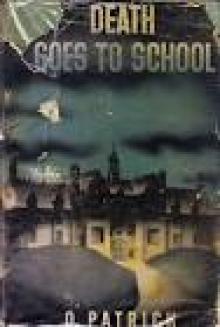 Death Goes to School
Death Goes to School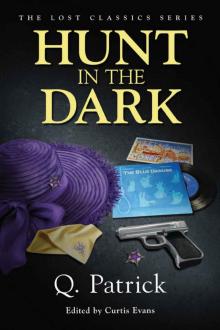 Hunt in the Dark
Hunt in the Dark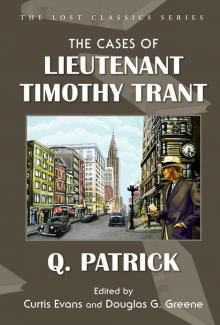 The Cases of Lieutenant Timothy Trant (Lost Classics)
The Cases of Lieutenant Timothy Trant (Lost Classics) Death for Dear Clara
Death for Dear Clara S.S. Murder
S.S. Murder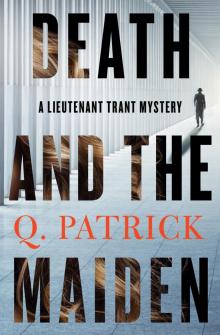 Death and the Maiden
Death and the Maiden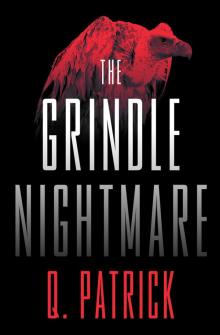 The Grindle Nightmare
The Grindle Nightmare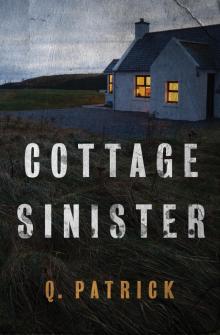 Cottage Sinister
Cottage Sinister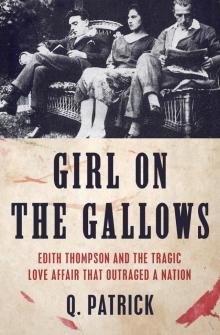 The Girl on the Gallows
The Girl on the Gallows